Army MOS 18X presents a distinctive chance for civilians to enter the prestigious U.S. Army Special Forces, famously known as the Green Berets.
This program permits you to enlist straight into Special Forces training without needing any prior military background.
As an 18X candidate, you’ll face demanding physical and mental tests to become one of the world’s most elite soldiers.
The 18X program offers a fast-tracked approach to becoming a Special Forces operator.
You’ll begin with basic training, progress to advanced individual training, and then attend airborne school.
Following this, you’ll undertake the rigorous Special Forces Assessment and Selection (SFAS) course.
If you are chosen, you will advance to the Special Forces Qualification Course, where you will cultivate specialized skills in one of four disciplines: weapons, engineering, medical, or communications.
Enlisting in MOS 18X can provide substantial financial rewards.
As of 2023, qualified candidates were eligible for enlistment bonuses of up to $40,000.
It’s important to note that these bonuses may fluctuate, so consulting a recruiter is the best way to confirm current details.
Key Points
- MOS 18X offers a direct avenue to Special Forces for civilians without prior military experience.
- The program entails rigorous physical and mental training, culminating in the Special Forces Qualification Course.
- Successful 18X candidates become Green Berets, specializing in roles such as weapons, engineering, medical, or communications.
Understanding 18X: The Special Forces Candidate Program
The 18X program offers an unmediated path to the Army’s elite Special Forces.
As an 18X candidate, you will embark on an intensive training course to become a Green Beret, facing severe physical and mental trials during your training.
Overview of MOS 18X
MOS 18X is a unique enlistment pathway that provides aspiring soldiers with the chance to qualify for Special Forces right from the start of their Army careers.
This program usually involves a commitment of 6 years.
As an 18X recruit, your training process will begin with basic training, followed by advanced individual training before progressing to specialized courses.
The 18X training path includes:
• Basic Combat Training
• Advanced Individual Training as an infantryman
• Airborne School
• Special Forces Preparation Course (SFPC)
The SFPC at Fort Bragg prepares you for the upcoming challenges by focusing on enhancing your physical fitness, land navigation capabilities, and mental fortitude.
Path to Becoming a Special Forces Soldier
Your journey to donning the Green Beret involves several rigorous stages.
After completing initial training, you will take on the arduous Special Forces Assessment and Selection (SFAS) course.
This challenging evaluation assesses your physical endurance, mental strength, and problem-solving skills.
Success in SFAS leads you to the Special Forces Qualification Course (SFQC), an extensive training program covering:
• Language and culture
• Survival skills
• Advanced tactical combat techniques
• Specialized training in one of four disciplines: weapons, engineering, medical, or communications
The entire qualification process can take as long as two years.
It’s a demanding journey, but for those who persevere, it results in joining one of the most respected and skilled units within the U.S. military.
Eligibility and Requirements
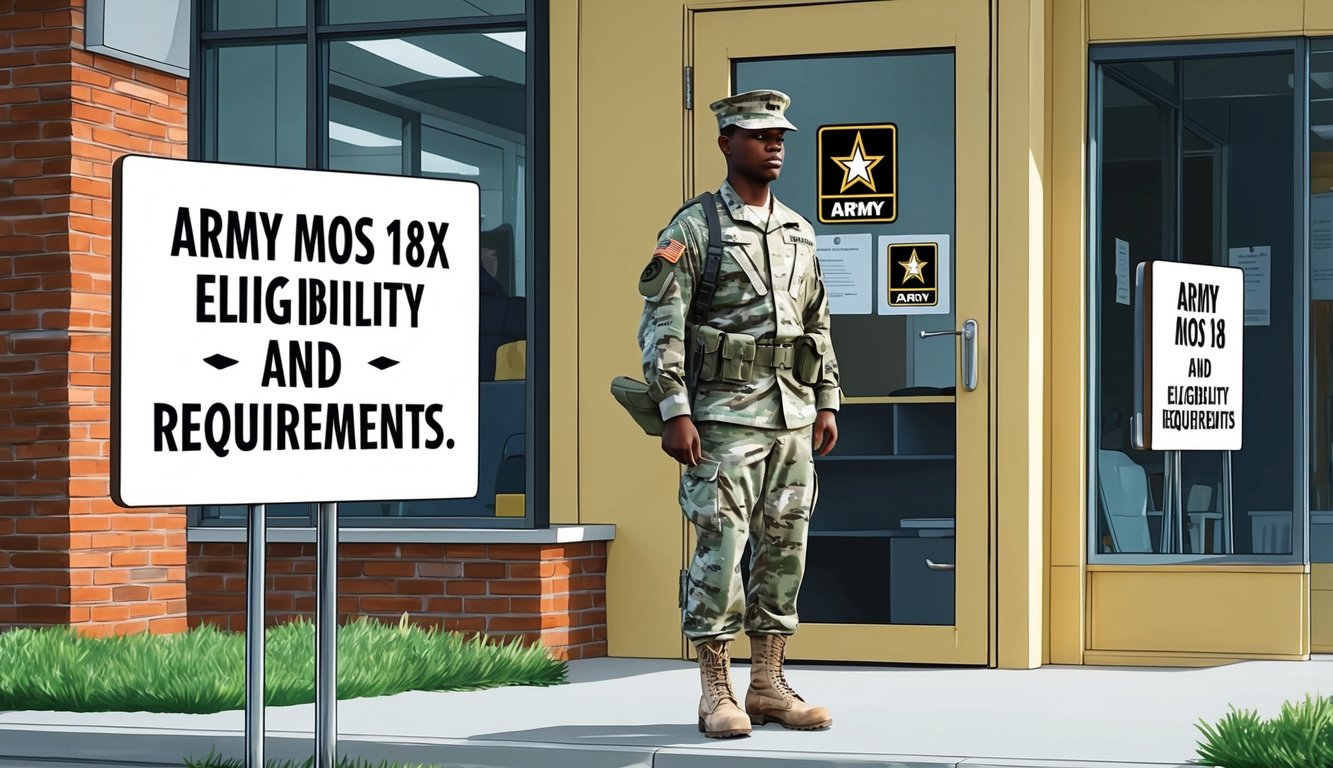
To join the Army’s Special Forces as an 18X candidate, you must meet strict eligibility criteria.
You must clear a number of requirements before you can embark on this elite career path.
Initial Qualifications
Prospective candidates for the 18X program need to be U.S. citizens aged between 20 and 34 years.
A high school diploma or equivalent is also necessary.
If you are currently serving, you should hold an E-3 rank or higher, with no more than 14 years of service time.
A clean criminal record and Secret security clearance are mandatory.
You must volunteer for Airborne training and agree to a 5-year enlistment contract.
ASVAB and General Technical Score
Your ASVAB scores are vital in determining your eligibility for the 18X program.
You need a minimum General Technical (GT) score of 110, which combines your scores in Word Knowledge, Paragraph Comprehension, and Arithmetic Reasoning.
Achieving a higher score can enhance your chances of selection.
If you do not initially meet the GT requirement, you may be able to retake the test after preparing.
Physical and Medical Standards
Physical fitness is critical for Special Forces candidates.
You must score well on the Army Physical Fitness Test, targeting a minimum of 60 points in each event: push-ups, sit-ups, and a two-mile run.
Swimming proficiency is also essential.
A comprehensive medical examination will evaluate your fitness for the demanding training ahead, with good vision being important, although corrective eye surgery may be acceptable if it complies with military standards.
Height and Weight Requirements
Adhering to the Army’s height and weight regulations is essential.
Your weight must align with your height according to Army guidelines.
For instance, if you stand 68 inches tall, your maximum weight must be 180 pounds.
If your weight exceeds this limit, your body fat percentage will also be considered.
Men must maintain a body fat percentage under 20%, while women must stay below 30%.
Consistently meeting these standards is critical to serving in the Special Forces.
Training Pipeline for MOS 18X
The path to becoming a Special Forces soldier through the 18X program is intense and impressive.
Throughout your training, you will navigate various challenging phases to achieve your Green Beret.
Basic Combat Training
Your journey as an 18X candidate begins with 10 weeks of Basic Combat Training (BCT) at Fort Jackson, Fort Benning, Fort Leonard Wood, or Fort Sill.
You will acquire fundamental soldiering abilities, such as:
• Weapons handling and marksmanship
• Land navigation
• First aid
• Military customs and courtesies
Physical fitness is a focal point.
You’ll participate in daily PT sessions to build up strength and endurance, including extensive ruck marches while carrying heavy loads.
One Station Unit Training
After completing BCT, you will undergo 6 weeks of Infantry One Station Unit Training (OSUT) at Fort Benning.
This training sharpens your foundational skills through:
• Advanced weapons training
• Small unit tactics
• Urban operations
You will face increased physical challenges, with longer and more arduous ruck marches.
High scores on the Army Physical Fitness Test are required to continue.
Airborne School
The next phase is a 3-week Airborne course at Fort Benning, where you will learn parachuting techniques and earn your jump wings.
Key components involve:
• Parachute landing falls
• Aircraft exit procedures
• Canopy control
You will execute 5 jumps, including one at night.
The course is demanding both physically and mentally, requiring you to conquer any fears related to heights.
Special Operations Preparation Course
The 4-week Special Operations Preparation Course (SOPC) at Fort Bragg marks your introduction to Special Forces training.
This course emphasizes:
• Land navigation
• Small unit tactics
• Physical conditioning
Expect rigorous PT sessions and lengthy ruck marches.
The SOPC is designed to identify candidates who are not prepared for SFAS.
Special Forces Assessment and Selection
SFAS is an exhaustive 24-day evaluation that tests your physical and mental endurance.
Participants face:
• Timed ruck marches of up to 40 miles
• Problem-solving tasks
• Sleep deprivation
• Psychological assessments
With only around 35% of candidates successfully passing, those who do gain entry into the Special Forces Qualification Course.
Special Forces Qualification Course
The Q Course spans 53-64 weeks of intense training at Fort Bragg, covering advanced skills in:
• Weapons and tactics
• Engineering and demolitions
• Medical care
• Communications
One of the highlights is Robin Sage, a 19-day field exercise focused on practicing unconventional warfare in a simulated hostile environment.
Language Training and Assignment
Your final training step involves 24-63 weeks of language instruction, depending on the complexity of your assigned language.
You’ll work towards developing the language skills necessary to communicate effectively with indigenous forces.
After graduation, you will be assigned to an operational Special Forces Group, marking the beginning of your adventure as a Green Beret.
Special Forces MOS Options After the 18X Program
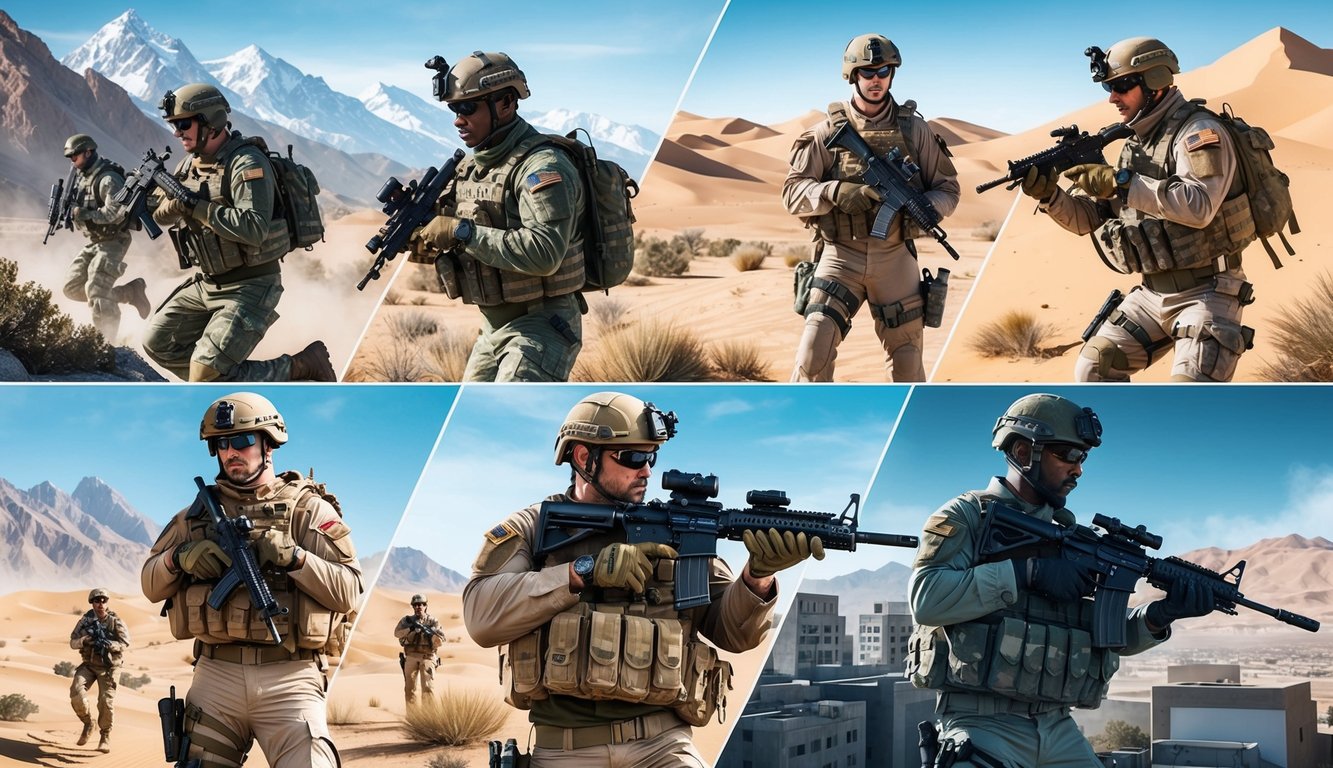
Upon completion of the 18X program, several specialized career paths within Special Forces await you.
Each role requires distinct skills and carries specific responsibilities critical to mission achievement.
Weapons Sergeant (MOS 18B)
As a Weapons Sergeant, you will become an authority on a wide variety of weapons systems.
Your responsibilities will encompass:
- Mastering both U.S. and foreign small arms, crew-served weapons, and anti-tank systems
- Planning and executing weapons training for your team and allied forces
- Providing guidance on weapon choices for particular missions
- Maintaining and repairing diverse weapon systems
You’ll also gain expertise in demolitions and air operations, as well as anti-armor tactics.
This position is particularly suited for those passionate about weapons and teaching others.
Engineer Sergeant (MOS 18C)
Engineer Sergeants are the construction and demolition professionals within Special Forces teams.
In this role, you will:
- Design and construct field fortifications, bridges, and various structures
- Plan and undertake demolition missions
- Train team members and partner forces in engineering functions
- Conduct reconnaissance of roads, airstrips, and urban areas
Your skills will be indispensable in both combat and humanitarian missions, and this position demands creativity, attention to detail, and the ability to perform under duress.
Medical Sergeant (MOS 18D)
As a Medical Sergeant, you are responsible for the health and welfare of your team and the local population.
Your duties involve:
- Providing both emergency and routine medical care in challenging environments
- Conducting medical training for your team and allied forces
- Managing medical supplies and equipment
- Contributing to humanitarian assistance missions
This position necessitates extensive medical training, encompassing advanced trauma management and preventive medicine.
It also requires calmness under pressure and a deep commitment to aiding others.
Communications Sergeant (MOS 18E)
Communications Sergeants play a crucial role in maintaining communication between team members and higher headquarters.
In this position, you will:
- Operate and maintain advanced communication devices
- Establish secure communication channels in remote regions
- Train team members and partner forces on communication protocols
- Assist in intelligence collection through signal interception
This role demands technical proficiency and the capability to resolve complex issues in demanding situations, making it ideal for individuals who enjoy working with advanced technology.
Intelligence Sergeant (MOS 18F)
As an Intelligence Sergeant, you will be the team’s specialist in collecting and analyzing intelligence.
Your responsibilities will include:
- Gathering and interpreting intelligence from multiple sources
- Conducting area studies and threat evaluations
- Training team members and partner forces in intelligence acquisition techniques
- Supporting mission planning based on intelligence insights
This role requires strong analytical abilities and critical thinking under pressure.
High attention to detail and effective communication skills are crucial for relaying complex information.
Career Progression and Opportunities
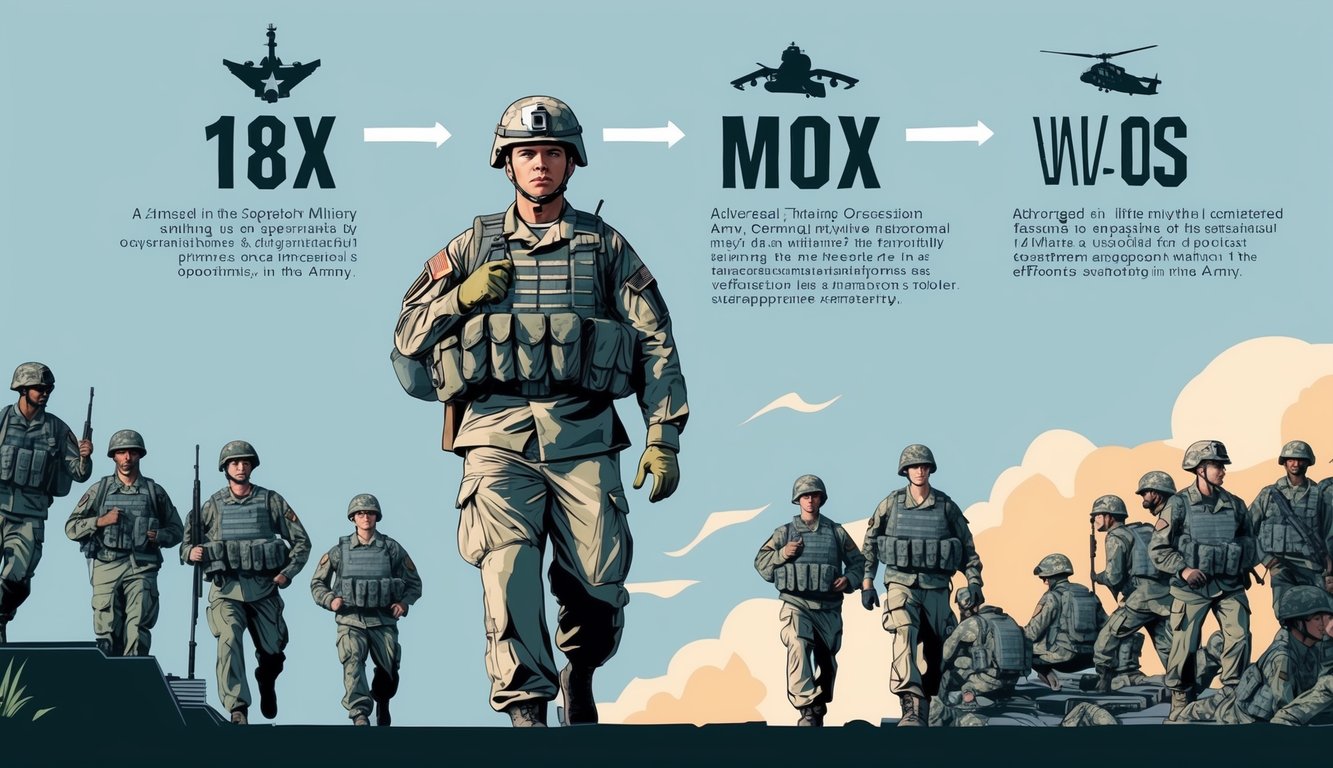
As an Army 18X Special Forces candidate, you are commencing a thrilling and demanding career path.
Your journey will begin with basic combat training, followed by advanced individual training and the rigorous Special Forces Assessment and Selection (SFAS) course.
Upon successful completion of SFAS, you will enter the Special Forces Qualification Course (SFQC).
This comprehensive training will equip you for your future role as a Green Beret, where you will refine your skills in weaponry, tactics, language, and cultural awareness.
After completing SFQC, you will be assigned to an Operational Detachment Alpha (ODA) team.
Here’s a brief overview of potential rank progressions:
- Sergeant (E-5)
- Staff Sergeant (E-6)
- Sergeant First Class (E-7)
- Master Sergeant (E-8)
- Sergeant Major (E-9)
As you progress, you may have the chance to take on roles such as team sergeant or operations sergeant, and you could explore training, leadership roles, or special assignments within the Special Forces community.
The Army provides competitive pay and benefits for Special Forces personnel.
You may also qualify for enlistment bonuses and additional duty pay.
Continuing education is encouraged, offering prospects to earn college credits and degrees during your service.
Your career in Special Forces can lead to various civilian roles post-service.
Many veterans successfully transition into areas such as law enforcement, security consulting, or positions within government agencies.
The journey through the 18X program is taxing yet rewarding, requiring commitment, physical prowess, and mental resilience.
Are you ready to take on the challenge?
Skills and Specializations Within the Special Forces
Special Forces soldiers cultivate a broad array of advanced skills to effectively carry out intricate missions.
These capabilities encompass combat, intelligence gathering, relationship development, and tailored tactical operations.
Unconventional Warfare
You will master the techniques of collaborating with and empowering local forces to fulfill military objectives.
This task includes training and equipping local groups, conducting sabotage, and gathering intelligence within hostile regions.
You will learn how to blend seamlessly with local communities, operating clandestinely for extended periods.
Key skills will include adaptability and cultural sensitivity while navigating complicated political landscapes.
Foreign Internal Defense
Your responsibilities will involve mentoring allied nations’ militaries to combat insurgency and enhance stability.
You’ll acquire skills in advising foreign troops, coordinating joint operations, and suggesting counterinsurgency tactics.
Proficiency in languages and skills in cross-cultural communication will be crucial as you forge relationships with partner forces.
This may involve living alongside local units for extended durations to provide consistent support.
Direct Action
You will develop expertise in executing raids, ambushes, and other short-duration strikes targeting high-value objectives.
This will include mastering advanced infantry tactics, breaching techniques, and close-quarters combat procedures.
Critical skills cultivated will encompass precision marksmanship, demolitions, and airborne infiltration.
You will learn to meticulously plan and execute complex assaults using limited resources in hostile settings.
Counterinsurgency and Counterterrorism
Your training will incorporate strategies aimed at countering insurgent and terrorist factions.
Key tasks involve gathering human intelligence, pinpointing threats, and conducting targeted operations to disrupt enemy networks.
You will hone skills in asymmetric warfare, psychological operations, and community engagement, all essential to countering extremist movements.
A deep understanding of the social and political factors driving conflicts will be vital.
Reconnaissance and Surveillance
You will learn cutting-edge methodologies for gathering intelligence in denied areas.
This may include using advanced surveillance gear, carrying out long-range reconnaissance operations, and relaying crucial information.
Skills in camouflage, stealth movement, and evasion will become second nature to you.
Expect to spend days or weeks observing targets while remaining undetected in demanding environments.
Combat and Tactics
Proficiency in infantry weapons and small unit tactics will form the cornerstone of your skill set.
You will gain expertise with a wide array of firearms, explosives, and specialized equipment.
Advanced medical training will ensure you can manage combat injuries in austere settings.
You will also learn to operate various vehicles, such as the Ground Mobility Vehicle, for rapid deployments and exit strategies.
Operational Environment and Deployment
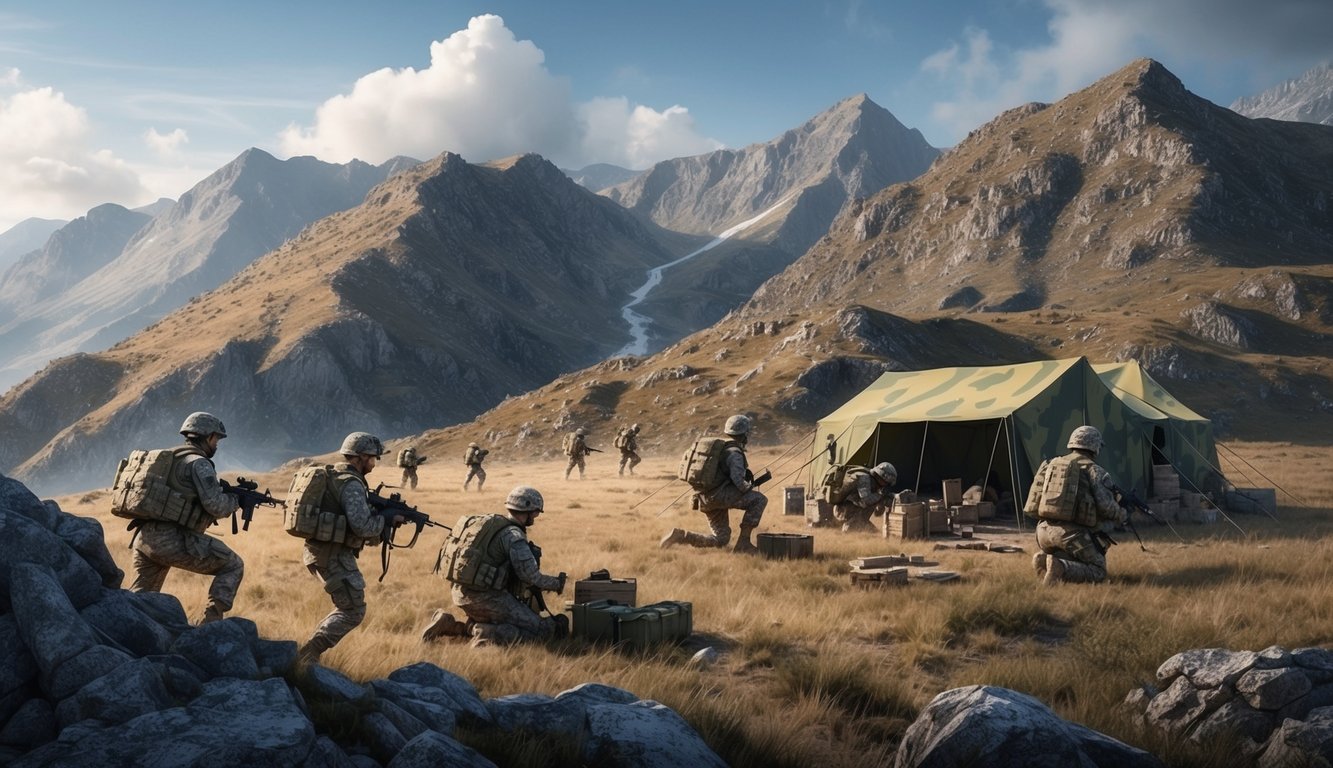
Special Forces personnel operate in multifaceted, high-stakes environments across the globe.
As an 18X, you will encounter a broad spectrum of challenges, ranging from counter-terrorism operations to foreign military training.
History and Past Deployments
Having a rich legacy, Green Berets have participated in numerous deployments dating back to the Vietnam War.
More recently, your service may have involved operations in Afghanistan or Iraq, as part of the Global War on Terror.
During these engagements, Special Forces units executed village stabilization missions, provided training to local forces, and carried out direct action operations targeting critical adversaries.
Your role might have included:
• Embedding with Afghan commandos
• Advising Iraqi counter-terrorism troops
• Conducting reconnaissance in hostile regions
Valuable lessons from these experiences continue to shape Special Forces doctrine and training today.
Current Operational Detachments
As an 18X candidate, you will become part of an Operational Detachment Alpha (ODA)—a 12-man elite team of Green Berets.
These small, specialized units operate globally, tackling intricate missions.
Your ODA could be assigned to:
- Train partner nation forces in Africa
- Conduct counter-narcotics operations in South America
- Support counter-insurgency initiatives in the Middle East
You must adapt swiftly to various cultures and operational settings.
One mission may require you to live in remote villages, while another could involve urban tactical operations.
ODAs often operate autonomously, in environments far from standard support.
This independence necessitates versatility and self-reliance in demanding conditions.
Life After Special Forces
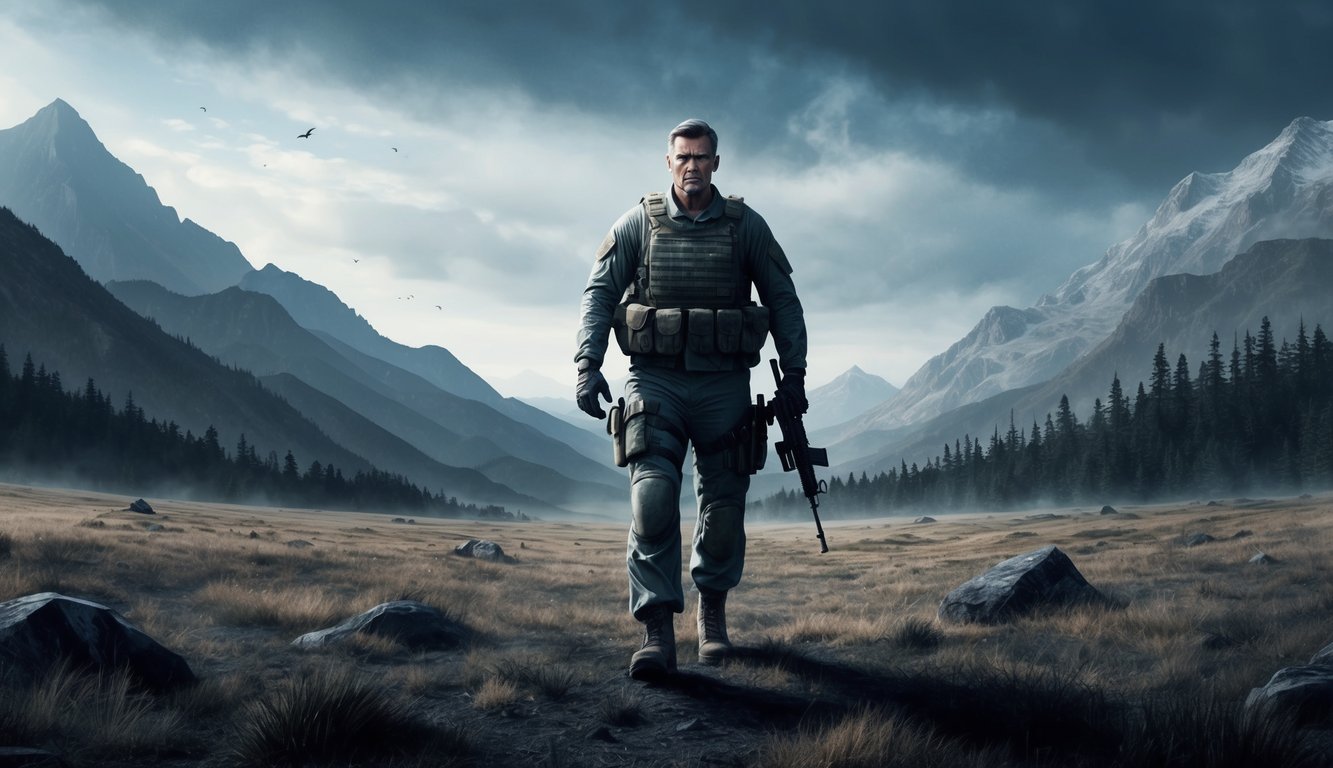
Transitioning from Special Forces back into civilian life can be a significant shift.
However, you will discover numerous job opportunities that value your unique training and experiences.
Many former Green Berets pursue careers in law enforcement, private security, or government positions.
Your specialized training makes you a compelling candidate for these roles.
Some veterans opt to leverage their leadership abilities in the corporate world, where project management, team leadership, and consulting emerge as popular options.
The military mindset you have developed, alongside your discipline, can also be advantageous in entrepreneurship.
Many Special Forces veterans start businesses or work as independent contractors.
Continuing your education presents another opportunity.
Your GI Bill benefits may support your pursuit of advanced degrees or technical certifications.
Don’t overlook the support available through Veteran Affairs, which offers resources for career guidance, healthcare, and mental health services.
Staying connected with the Special Forces community can also provide value.
Veteran organizations and alumni networks offer both support and opportunities for networking.
Frequently Asked Questions
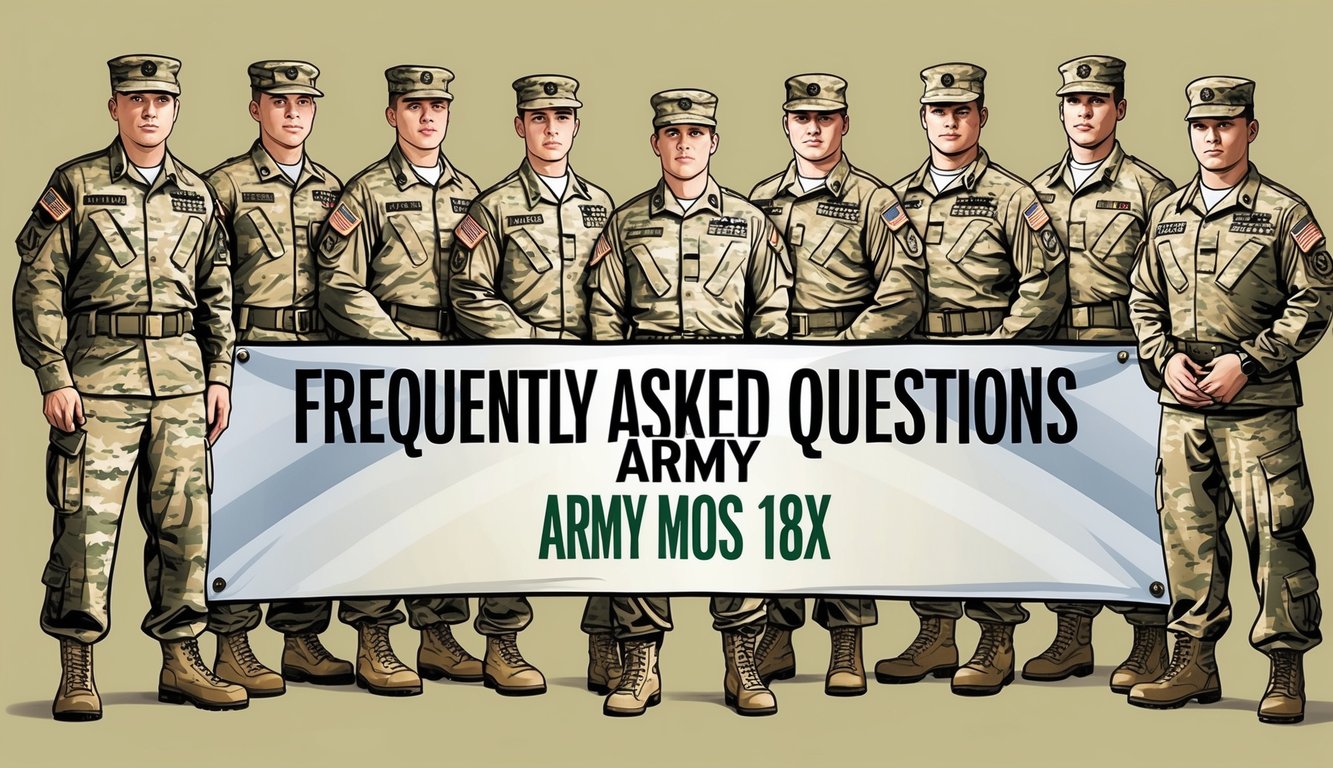
Joining the Army’s 18X program requires meeting specific criteria and understanding the crucial aspects of this career path.
Let’s answer some frequently asked questions about this Special Forces route.
What is the maximum age to enlist in the 18X program?
The standard age limit for enlisting in the 18X program is usually 35 years old, although age waivers may be considered in certain instances, especially for candidates possessing valuable skills or previous military experience.
How much does an 18X soldier typically earn?
The salary for 18X soldiers varies based on rank and experience.
New recruits typically start at the E-4 pay grade, with potential for significant salary increases as you acquire additional skills and qualifications.
What are the precise requirements to qualify for MOS 18X?
To qualify for MOS 18X, you must achieve a minimum ASVAB score of 110 in the General Technical category and at least 100 in Combat.
You must also be a U.S. citizen, pass a strenuous physical fitness test, and secure a Secret security clearance.
How long is the contract for an 18X enlistee?
The typical contract length for 18X candidates is around 5 years.
This timeframe allows sufficient training and a substantial duration of service in Special Forces if you successfully complete the qualification process.
What level of physical fitness is required for the 18X MOS?
You should be in excellent physical shape for the 18X MOS.
Prepare for rigorous cardio, strength training, and endurance workouts focusing on running, swimming, push-ups, pull-ups, and ruck marching to meet demanding fitness standards.
Can you explain the various roles within Special Forces accessible through the 18X pathway?
Absolutely! The 18X route opens opportunities to pursue various Special Forces roles, including weapons sergeant, engineering sergeant, medical sergeant, communications sergeant, and intelligence sergeant.
Your particular role will be determined by your unique aptitudes and the Army’s requirements.

